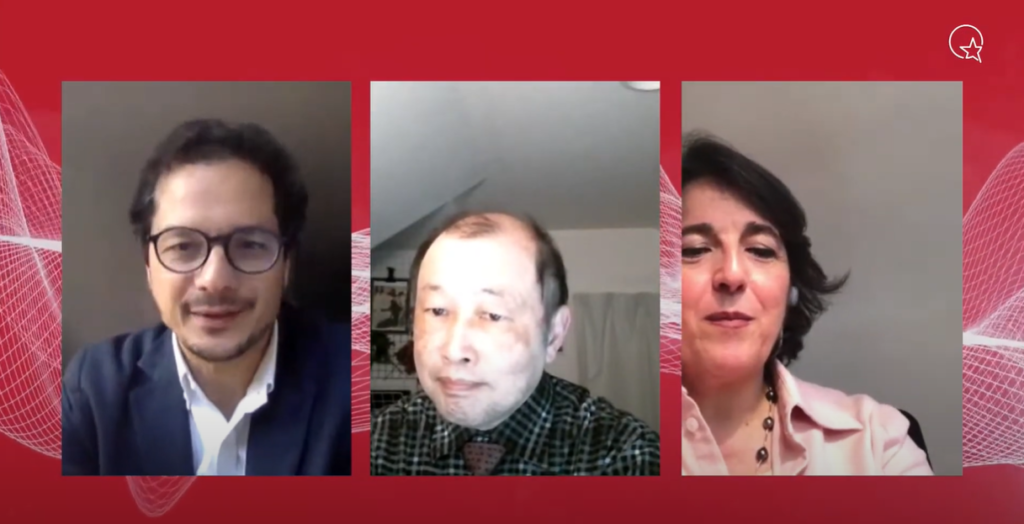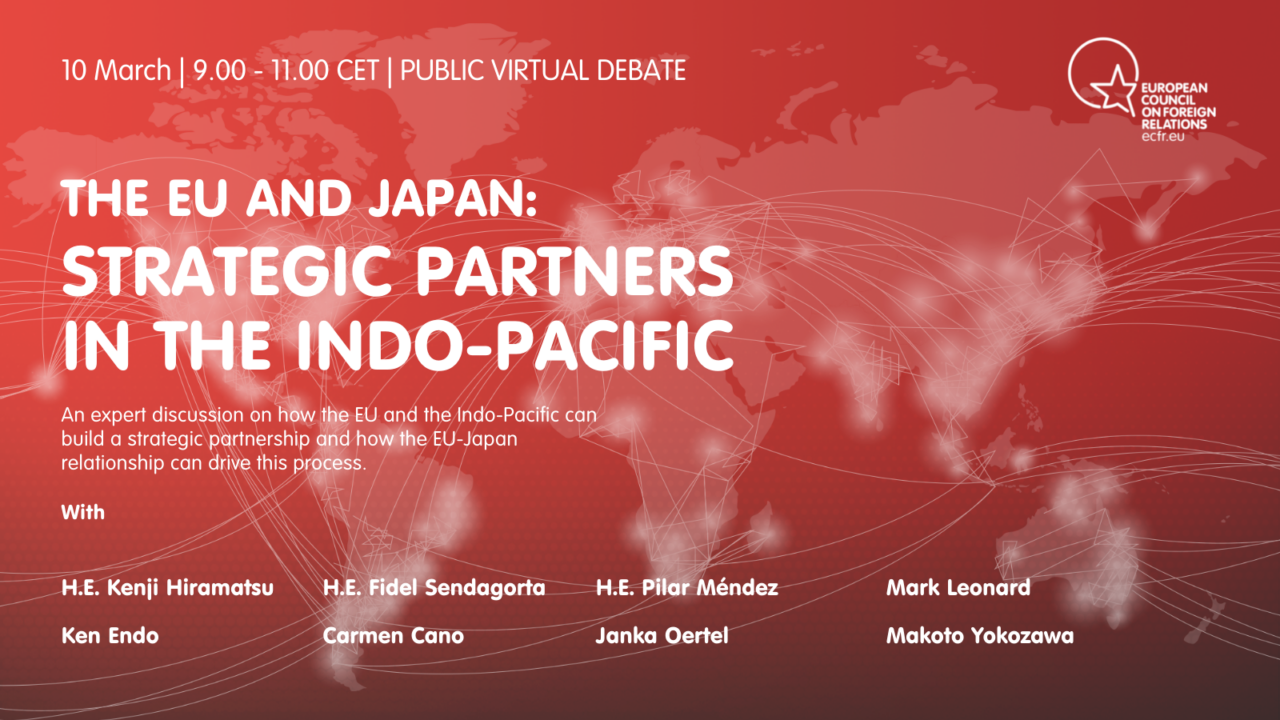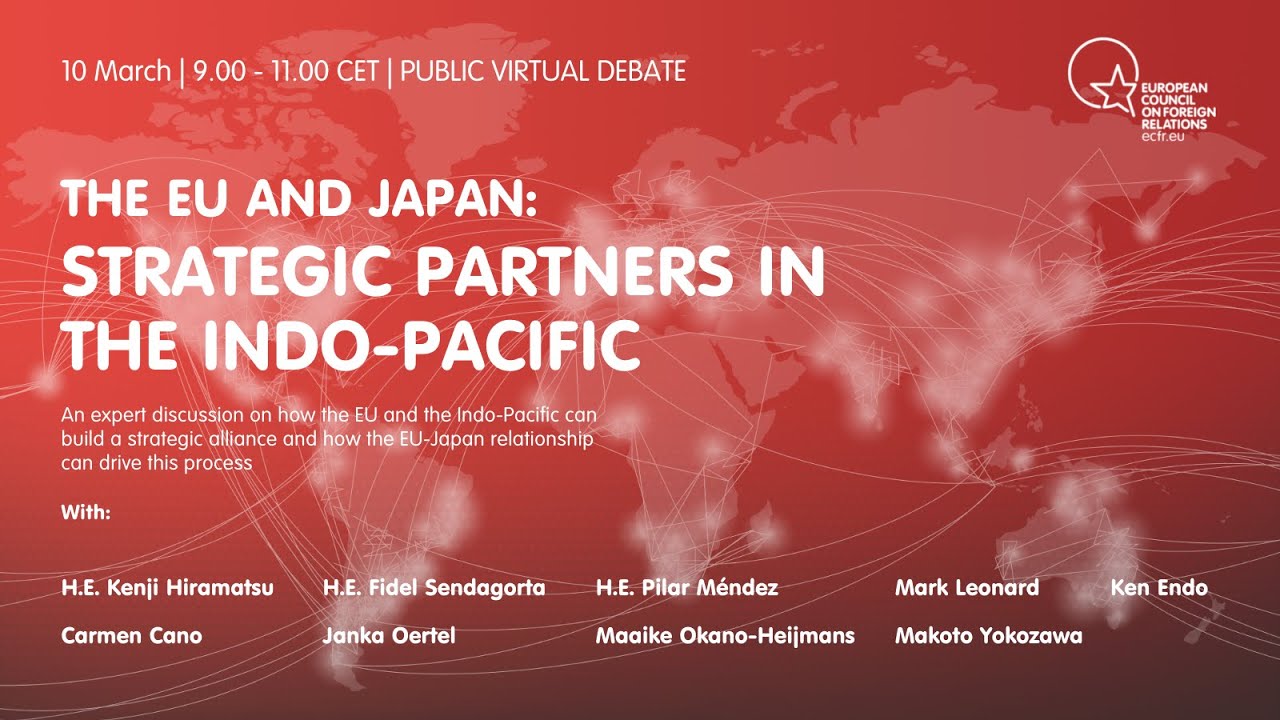The EU and Japan: Strategic Partners in the Indo-Pacific
Summary of key points raised during the discussion on how the EU and the Indo-Pacific can build a strategic alliance and how the EU-Japan relationship can drive this process
The future of Europe is inextricably linked with that of the Indo-Pacific. Current dynamics in the latter have produced intense geopolitical competition and tensions on trade, technology, and security. As a key partner for the region, the EU seeks to further deepen its engagement with the Indo-Pacific to respond to emerging challenges affecting its stability. Here, EU-Japan cooperation will be instrumental. How can both partners build and share effective protections against the threat of economic coercion increasingly exerted by great powers? How can they advance regional security cooperation and promote a rules-based digital transformation and connectivity agenda?
In collaboration with the Embassy of Japan in Madrid, the European Council on Foreign Relations organised a public virtual debate on Thursday 10th March, 9:00 –11:00 AM CET, to explore how the EU and the Indo-Pacific can build a strategic alliance and how the EU-Japan relationship can drive this process. The event brought together leading government representatives from both regions and experts from academia and think tanks who provided their thoughts as speakers in two panel discussions that were live-streamed.
Below are the key points raised during the discussion.
A golden age of EU-Japan relations and the need for continued cooperation
There are several empirical and structural factors that indicate that we are living in a «golden age» of relations between the European Union and Japan, as one of our speakers described it. In the past several years, there has been a growth of interest and understanding of the Indo-Pacific region in the European countries, including Spain. In September of 2021, the EU published its Strategy for Cooperation in the Indo-Pacific, laying the groundwork for broader engagement in the region, and reflecting the EU’s understanding that the center of gravity is shifting towards the Indo-Pacific in geoeconomic and geopolitical terms. In this strategy, the EU demonstrated clearly that it views Japan as a key partner. Both have recently spent considerable time and energy upgrading their relationship formally and practically – via, for example, economic partnership agreements, bilateral discussions, the Partnership on Sustainable Connectivity and Quality Infrastructure, joint naval exercises, railway sector cooperation in Asia, and so on.
As the EU has slowly stepped up its global presence, it has, in contrast to China, the US, or other major powers, attempted to do so by shaping and adopting a geopolitical governance model based on rules and driven by values – a humanist approach. Therefore, it is not surprising that strategic partners in the Indo-Pacific have become such an important part of the EU’s external strategy, for it is there the EU can find truly like-minded partners; Japan being a particularly good example, with whom the EU shares a connection in this regard, both representing strong and vital democracies whose power grows out of a deeply entrenched culture of civilian power.
The current geopolitical context of aggression in Eastern Europe, of an increasingly assertive China, and of a United States that has relinquished its global leadership, opting for more direct bilateral competition with China, highlights the importance of continuing to build and ramp up this strategic alliance between Japan and the EU in order to work together towards the realization of a free and open Indo-Pacific. Though remarkable progress has been made in recent years, there are still significant areas of improvement. The Indo-Pacific is a global growth driver comprising more than half of the world’s population. Beyond commercial and trade relations, in order to achieve its security and prosperity and freedom from economic coercion, the EU and Japan have to strengthen their cooperation in maritime security, infrastructure development, build synergies between the EU’s Global Gateway and the Japan-EU Partnership on sustainable connectivity and quality infrastructure, as well as the improvement of supply chains. There is also room for stronger cooperation between the European and Japanese defense industries – and cooperation in the area of security more broadly, which has not developed enough as of yet. Our partnership will also matter for energy security and decarbonization. The endgame is that renewable energies will serve to fight both climate change and energy insecurity. But we must figure together how to do this transition – a key issue of our common agenda.
What the war in Ukraine means for the EU-Japan partnership in the Indo-Pacific
Today we are confronted with a war in Ukraine. Both Japan and the EU share an interpretation of the situation: the war is, unquestionably, an aggression by Russia that constitutes an infringement of the democratic sovereignty and territorial integrity of Ukraine, as well as a flagrant violation of the universal rule of law, democracy, human dignity and almost everything Japan and the EU stand for.
Both parties have been impressed by each other’s response to the conflict. European states have welcomed the swiftness of Japan in responding to Russian aggression, who, in solidarity with European and North American allies, has adopted strong sanctions against both Russia and Belarus. Japan was also impressed by the EU, and the unity and sense of purpose with which it has reacted, and the firmness of European leadership in this moment of crisis and assertiveness with which European states, previously wallowing in neutrality, have determined to act swiftly and provide defense aid to Ukraine. Therefore, we can foresee a new phase of security relations between Japan and the EU, especially in the framework of the Indo-Pacific – on both hard and soft security – that, in the current context, has acquired special significance for both partners. Additionally, the current moment of violence and aggression highlights several key themes that are relevant for the discussion of the future of the Indo-Pacific, and for Japan and the EU themselves; namely, the shared consternation over the role of an increasingly unreliable United States – forcing both to look for other partners – the shared consternation over the much more vivid competition between autocracy and democracy in Europe and in the Indo-Pacific, and the lingering questions about rules versus power that will be central to our discussions going forward.
A key theme that emerged throughout this discussion was the need for reinforcing and reestablishing the principle of non-violence when seeking a change in the status quo. This has significance for both European security and for security in the Indo-Pacific. It would be disastrous, at this particular time, to leave authoritarian regimes unchecked.
A dangerous parallel can be glimpsed between the Russian aggression against Ukraine and the potential violent affecting of the status quo in Taiwan – the latter being almost the same situation as the former. As in the case of Russia, China does not recognize the importance of a democratically governed Taiwan. Often and loudly, China has refused to accept even the principle of non-violent change of the status quo, leaving the door open to a similar aggression as the one currently underway in Ukraine. In this regard, the point was made during our discussion that the same unity seen in response to the invasion of Ukraine should also be seen in the case of a move against Taiwan. The European Union and Japan should prepare contingencies to respond to such a scenario – and even the scenario where such dual aggressions could happen simultaneously – with the same unity as they have in Ukraine, that we elaborate a division of labor, so to speak, to prepare for if/when these things happen simultaneously. On this, we must not be caught unawares.
Protecting our markets and fighting economic coercion in the Indo-Pacific
The importance of economic security and the need for specific European instruments to safeguard it
The Ukrainian crisis is bringing the EU, the Indo-Pacific and Japan much closer together. It is not only a crisis in Europe. It affects international values that underpin the world order. It has also revealed a much more vocal and assertive European Union. Its response has been well noted around the world. The EU, thus, remains very credible and is seen as being able to play a role in the Indo-Pacific, where it is already an important economic actor. Therefore, it is now more necessary than ever to guarantee mutual economic security and trustworthy supply chains.
Overall, it is clear we need to have at our disposal instruments to defend ourselves when rules are not respected, when we are coerced or bullied. We must focus on the EU’s trade policy; one of its most powerful tools. It is, first and foremost, about unity – with decisions taken by majority – and through it, the EU has built resilience and made possible its open strategic autonomy. It is not a protectionism tool. The EU wants to be able to make its own choices without pressure. And it comes at the perfect time, as the world becomes more hostile, as China’s assertiveness rises, as the US retreats from world leadership and enters into more direct bilateral competition with China, which is unfolding largely in the Indo-Pacific. This is why the EU has been developing these specific instruments, to be able to react to this changing world and fight the lack of global reciprocity; tools like the Trade Defense Instrument, the Foreign Investment Screening Mechanism, the Procurement Instrument, and the Anti-Coercion Instrument. Though all these measures should only be a last resort, we still need them to protect ourselves against the kind of economic warfare being wages, for example, through the medium of energy supplies by Russia.

China’s economic coercion
China has become an actor that is practicing the art of economic coercion ever more skillfully, and, with growing economic strength, its portfolio only grows bigger, its capacity larger. However, we have also seen countries in the Indo-Pacific fighting back in an impressive way – Australia, for example – perhaps even more so than the EU. Europe has beefed up its tools. But the Ukraine crisis is an inflection point. It really has to tell us that/if something is new in the system.
We have received a good lesson since the start of the Russian invasion of Ukraine in taking seriously what authoritarian leaders say. Xi Jinping has been saying he wants to make other countries dependent on China while making China less dependent on others. He has also used words like “struggle”. He is preparing for a downgraded economic prosperity, preparing his country for it, and he has taken positions – such as straddling the grey zone with regard to supporting Russia – that seem to counter China’s own interests and make it harder for China to cooperate with the EU and the US on economics. Why is this? We have to revisit our assumptions about what China’s interests are. Our steps to combat China’s coercion are good and we are proud of them, but perhaps we might be partially in the wrong battlefield. China is using economic coercion tools for political ends; not just economic ones and we have not yet developed the complementary political measures to reinforce our economic tools. In the end, the economic side may not matter as much to China as we think. Consequently, the conclusion from the events of the past few weeks, is not that we are showing China this enormous degree of unity, but that we are not showing the political response to its actions yet (threaten the cancellation of key summits, propose joint delegations to Taiwan, working with the developing world at the UN level to create a greater diplomatic pressure on China, etc.).
We have to move from our purely trade comfort zone into the more awkward and confrontational effects that joint diplomatic responses could have. And that can only happen with Indo-Pacific unity, with Indo-Pacific countries and European countries working together, otherwise it will be very difficult to make Beijing uncomfortable.
Facing the digital transformation and promoting rules-based connectivity
For many, technology was always something inaccessible and far away. Now, with the invasion of Ukraine, it has gained full protagonism as a key tool of hybrid warfare. Technology is the future, but it is also a key vulnerability that can be used by states to coerce. What connects us and brings us together can also be used against us; this is so for technology as much as for energy dependencies. Here the discussion focused on how the EU and Japan cooperate on tech and how they can extend their cooperation to the multilateral level.
Data policy and multilateral organizations
The Indo-Pacific is not a single market like the European Union. Data flows, and data policy overall, in the former are asymmetric. There are hurdles placed upon data flows by the fact that there is an inter-dependency between the free and open data systems of some democracies and the restrictive systems of authoritarian governments – a democratic style of data policy coexists with an autocratic style. Additionally, in a region without such a single market, often more restrictions are brought in by countries like Canada or Australia, whose strong rules-based data protection systems and privacy guarantees also obstruct data flows. It is, consequently, essential that we think about rules-based connectivity in the Indo-Pacific and create guidance for common data policy – without necessarily expecting a full single market progression.
Here, multilateral organizations can serve a real purpose. At the OECD, for example, the EU, Canada, Australia, etc., all come together to work on building policy guidance for rules-based connectivity. And it is particularly important because, often, governments compel private sector companies to reveal personal data in a way that these companies cannot refuse. This data can then be weaponized or used for military purposes – look, for example, at the situation in Ukraine. This is very important, and a critical aspect of the information war. Data can be a powerful tool. We should then be thinking about how we can make government access to data more democratic and subject to humanitarian rule. This sort of policy guidance-setting is very important, and it need not develop through major multilateral fora: it can also happen at the “mini-lateral” level, meaning mini multilateral trade agreements that can move the needle, such as the recent agreements reached between Chile, Singapore, and New Zealand, known as DEPA. These approaches can be studied and followed.
Of course, major European legislation like the General Data Protection Regulation (GDPR) have been globally influential. But, do we want a replica of the GDPR in the Indo-Pacific? Perhaps Japan’s approach is the more realistic path to follow. Japan has enacted an adequacy recognition with the EU’s data guarantees while simultaneously engaging in co-regulation with the US via its Apex Programs. It was suggested, then, that, to strengthen digital/tech cooperation and expand the GDPR concept to an Indo-Pacific setting, this mixing was the best course of action: infusing local/regional policy with the values and humanist perspectives of the GDPR with some flavor of the co-regulation approach utilized with the US.

Tech standards and patents: the new and future battleground of geo-tech politics
In the context of connectivity and digital transformation, Japan and the EU can cooperate in very visual areas like 5G, infrastructure, submarine cables, etc., and also in less visible areas like data protection, data free flow with trust, etc
In this second category, we should include tech standards, in which the rest of the world is already cooperating. This is an important area to look at right now because we risk falling behind. The standardization patents are very significant tools. They are the next frontier of power politics competition. One thing to admire about China is that their governance model allows them to think very strategically and with long-term perspectives –something democracies should improve. China has already launched its own initiative, China Standards 2035, which aims to make China a first-year incubator of tier 1 technology companies that set the standards in place, thus making the country a net receiver of licence fees. To further this, China has already developed many standards cooperation agreements along its Belt and Road Initiative. This has an essential geopolitical purpose. Patents are a major long-term dependency tool. When you own a patent, your power carries on through generations. They are also tools for inter-dependency and long-term partnerships. We may already be in a standards world war.
The topics covered in this summary are drawn directly from the full discussion among the speakers who participated in the event. The ideas and arguments are, and should be, attributed to them. You can view the full breakdown of speakers and panels here. You can also watch the recording of the full dialogue below.
El Consejo Europeo de Relaciones Exteriores no adopta posiciones colectivas. Las publicaciones de ECFR solo representan las opiniones de sus autores individuales.


